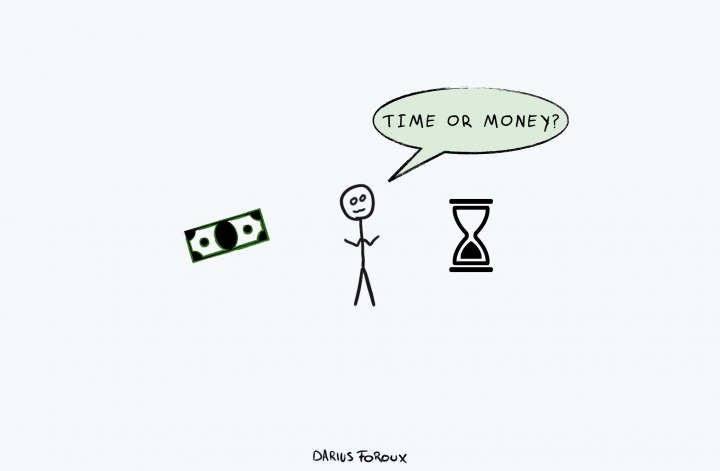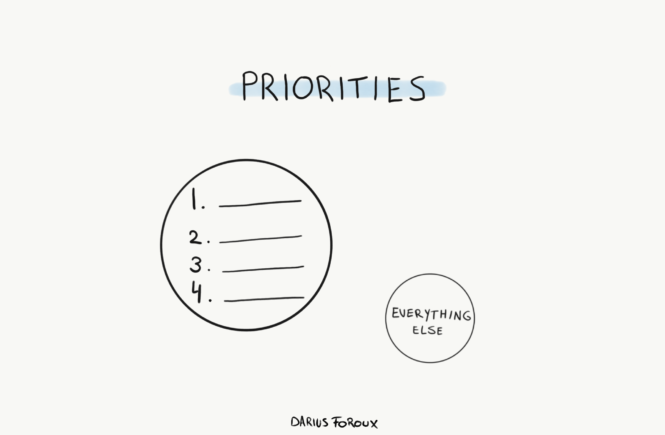In the hunter-gatherer phase of humanity, we exchanged our time for food. We spent hours, sometimes days, hunting or gathering food to survive.
When the agricultural revolution started around 10,000 BC, we no longer had to hunt for food. We used the land to harvest crops, domesticate animals, and develop food right where we lived.
We started spending less time acquiring food. Fast forward to the 21st century, where we can buy food in an instant online, which gets delivered to our front door.
We rarely spend time acquiring food nowadays. Instead, we use our time to acquire money, which we exchange for food.
But here’s the thing. We take that arrangement way too extreme. We exchange almost ALL our time for money. That doesn’t sound like a good deal to me.
If we have a demanding job, we work during the day and think about our work during our time off. We’re mentally taxed with work. And let’s face it, we mostly work to earn money so we can not only buy food, but also all kinds of other things.
Start buying back your time
Here’s the point of this article. You and I spend a lot of time earning money. And in our world, time is money. To a degree, this is a good arrangement because we don’t have to hunt for food.
But since we’re spending our hard-earned money on all kinds of other things, we get trapped. We need to keep working to pay the bills. But there’s a different way to live.
Joel Greenblatt, the famous investor and author of You Can Be a Stock Market Genius, said it best:
“While to many “time is money,” it’s probably more universal to say that “money is time.” After all, time is the currency of everyone’s life. When it’s spent, the game is over. One of the great benefits of having money is the ability to pursue those great accomplishments that require the gifts of being and time.”
The reason many people want to earn more money is that they want to trade it for more time, not a better car, a luxurious vacation, or a bigger house.
How to buy time
While everyone loves the idea of waking up with a million bucks, the reality is that earning money happens slowly. It’s a gradual process.
As you go through life, you can accumulate more money, and if you play it right, you can use that money to work less. More money also means you can say no to work you don’t want to do.
Here are a few tips for buying back your time.
- Spend your money mindfully—Every penny you spend means less financial freedom. Just keep that in the back of your mind. But don’t become so stingy that your life becomes a punishment.
- Increase your earnings potential—The more valuable skills you have, the more potential you have to earn more. Investing in your skills and personal development is something you can leverage to make money.
- Invest in assets—As asset prices go up, you will profit from it. You increase your wealth by sitting and waiting.
All these things take time to pay off. That means you can’t buy back all your time tomorrow. It’s also not necessary.
While a lot of people fantasize about the day they can retire, what’s the use? We aren’t made for sitting around and doing nothing. Remember your roots. Our ancestors were evolved to hunt, gather, take care of each other, and ultimately; to survive.
If you take away all of that activity, you’re doing something that’s against your nature. Retirement is a concept of the modern world. I haven’t found any evidence that suggests our ancestors retired at a certain age.
Sure, hunting was a young person’s game. But the older people had all the knowledge and wisdom. Without our elderly, we couldn’t survive.
More money is good—but not at all costs
If you’re a long-time reader of my blog, you know I practice Stoicism and Mindfulness. I’m a big fan of those philosophies because they teach personal independence.
You never want to cling to anything—especially not to money. That’s why I always talk about that when I talk about money. It’s good to put things in perspective.
Some people find it difficult to balance the pursuit of wealth with the pursuit of inner peace—I’ve learned you can do both.
The way I balance wealth and inner peace is to be willing to part with my wealth at any given moment. While I enjoy the fact that I have enough financial security to work for myself and not worry about my future, I’m not afraid to let everything go.
I regularly meditate on loss and what it feels like to start over again. Having money is great because it can buy you time. But if you lose your money, it’s not the end of the world as long as you have your sanity.




